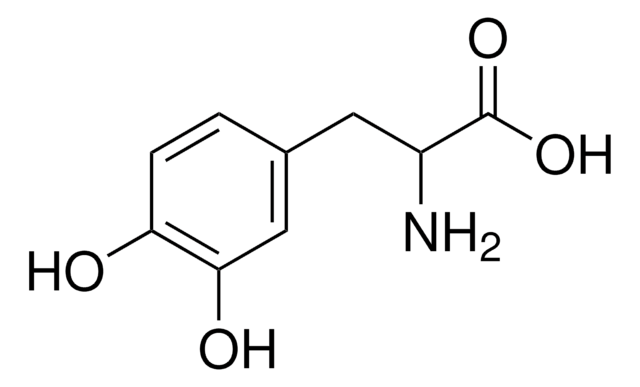H0751
Homogentisic acid
crystalline
Synonym(s):
2,5-Dihydroxyphenylacetic acid
Sign Into View Organizational & Contract Pricing
All Photos(1)
About This Item
Linear Formula:
(HO)2C6H3CH2CO2H
CAS Number:
Molecular Weight:
168.15
Beilstein:
2692860
EC Number:
MDL number:
UNSPSC Code:
12352100
PubChem Substance ID:
NACRES:
NA.22
Recommended Products
form
crystalline
color
off-white to tan
mp
150-152 °C (lit.)
storage temp.
2-8°C
SMILES string
OC(=O)Cc1cc(O)ccc1O
InChI
1S/C8H8O4/c9-6-1-2-7(10)5(3-6)4-8(11)12/h1-3,9-10H,4H2,(H,11,12)
InChI key
IGMNYECMUMZDDF-UHFFFAOYSA-N
Looking for similar products? Visit Product Comparison Guide
General description
Homogentisic acid (HGA) is an intermediate formed during the catabolism of phenylalanine and tyrosine. Alkaptonuria, a metabolic disorder, is characterized by high levels of HGA in serum and urine due to the deficiency of the enzyme homogentisic acid oxidase, which is involved in the degradation of HGA.
Storage Class Code
11 - Combustible Solids
WGK
WGK 3
Personal Protective Equipment
dust mask type N95 (US), Eyeshields, Gloves
Certificates of Analysis (COA)
Search for Certificates of Analysis (COA) by entering the products Lot/Batch Number. Lot and Batch Numbers can be found on a product’s label following the words ‘Lot’ or ‘Batch’.
Already Own This Product?
Find documentation for the products that you have recently purchased in the Document Library.
Customers Also Viewed
Laura Tinti et al.
Rheumatology (Oxford, England), 50(2), 271-277 (2010-10-19)
Alkaptonuria (AKU) is a genetic disorder caused by lack of the enzyme responsible for breaking down homogentisic acid (HGA), an intermediate in tyrosine metabolism. HGA is deposited as a polymer, termed ochronotic pigment, in collagenous tissues. Pigmentation is progressive over
Huaixin Zheng et al.
Infection and immunity, 81(11), 4182-4191 (2013-08-28)
Iron acquisition is critical to the growth and virulence of Legionella pneumophila. Previously, we found that L. pneumophila uses both a ferrisiderophore pathway and ferrous iron transport to obtain iron. We now report that two molecules secreted by L. pneumophila
Homogentisic acid autoxidation and oxygen radical generation: implications for the etiology of alkaptonuric arthritis.
Martin Jr, et al.
Free Radical Biology & Medicine, 3(4), 241-250 (1987)
Corinne Raspail et al.
The Journal of biological chemistry, 286(29), 26061-26070 (2011-05-27)
4-Hydroxyphenylpyruvate dioxygenase (HPPD) catalyzes the conversion of 4-hydroxyphenylpyruvate (HPP) into homogentisate. HPPD is the molecular target of very effective synthetic herbicides. HPPD inhibitors may also be useful in treating life-threatening tyrosinemia type I and are currently in trials for treatment
Z L Hegedus et al.
Archives internationales de physiologie, de biochimie et de biophysique, 102(3), 175-181 (1994-05-01)
Homogentisic acid (HGA) spontaneously starts to undergo oxidation and polymerization soon after the beginning of incubation in human blood or plasma at 37 degrees C, and forms plasma soluble melanins (PSM). Haemolysis accompanies this process in blood. The addition of
Our team of scientists has experience in all areas of research including Life Science, Material Science, Chemical Synthesis, Chromatography, Analytical and many others.
Contact Technical Service










